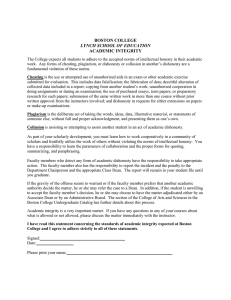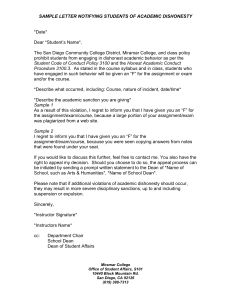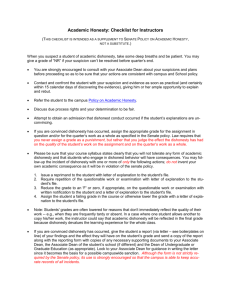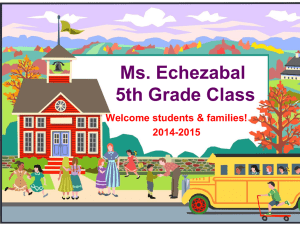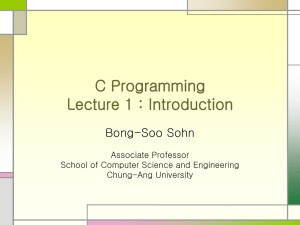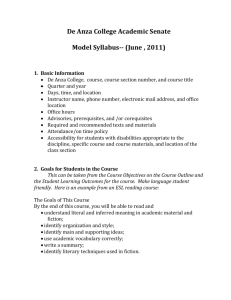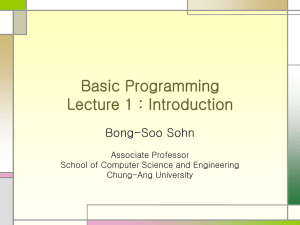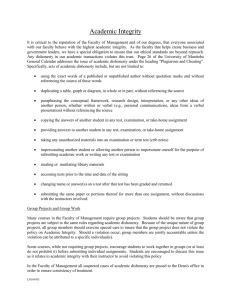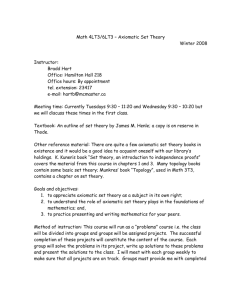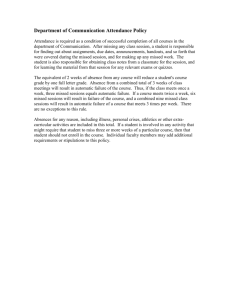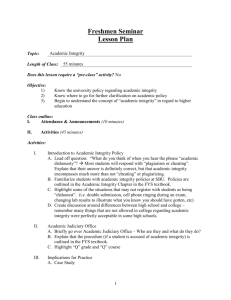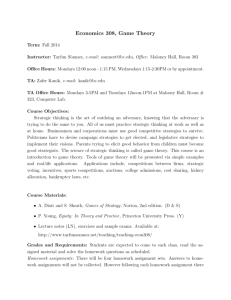ITCS 2215 – Section 001 - Department of Computer & Information
advertisement
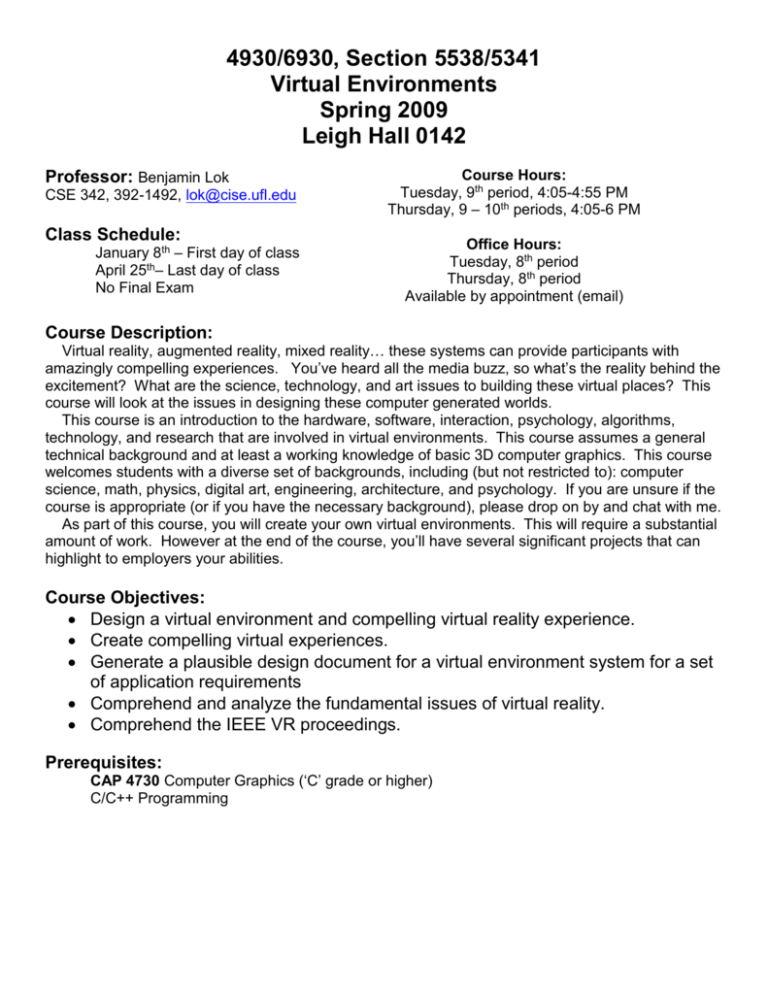
4930/6930, Section 5538/5341 Virtual Environments Spring 2009 Leigh Hall 0142 Professor: Benjamin Lok CSE 342, 392-1492, lok@cise.ufl.edu Class Schedule: January 8th – First day of class April 25th– Last day of class No Final Exam Course Hours: Tuesday, 9th period, 4:05-4:55 PM Thursday, 9 – 10th periods, 4:05-6 PM Office Hours: Tuesday, 8th period Thursday, 8th period Available by appointment (email) Course Description: Virtual reality, augmented reality, mixed reality… these systems can provide participants with amazingly compelling experiences. You’ve heard all the media buzz, so what’s the reality behind the excitement? What are the science, technology, and art issues to building these virtual places? This course will look at the issues in designing these computer generated worlds. This course is an introduction to the hardware, software, interaction, psychology, algorithms, technology, and research that are involved in virtual environments. This course assumes a general technical background and at least a working knowledge of basic 3D computer graphics. This course welcomes students with a diverse set of backgrounds, including (but not restricted to): computer science, math, physics, digital art, engineering, architecture, and psychology. If you are unsure if the course is appropriate (or if you have the necessary background), please drop on by and chat with me. As part of this course, you will create your own virtual environments. This will require a substantial amount of work. However at the end of the course, you’ll have several significant projects that can highlight to employers your abilities. Course Objectives: Design a virtual environment and compelling virtual reality experience. Create compelling virtual experiences. Generate a plausible design document for a virtual environment system for a set of application requirements Comprehend and analyze the fundamental issues of virtual reality. Comprehend the IEEE VR proceedings. Prerequisites: CAP 4730 Computer Graphics (‘C’ grade or higher) C/C++ Programming Tentative Course Topics: Introduction to VR: Define VR, show examples History of VR Tracking Inputs and Outputs Display Interface Devices Audio Presence Special Topics Virtual Characters Augmented Reality Mixed Reality Distributed VR Course Webpage: http://www.cise.ufl.edu/~lok/teaching/ve-s09/ Grading: 4% Class Participation 8% Paper Presentation 8% Quizzes on Readings 20% Project 1 – Tracking 20% Project 2 – Displays 20% Project 3 – Presence 20% Project 4 – Interfaces Teaching Style – Questions are encouraged. Interaction is encouraged (but not required). Critical thinking is stressed. I want you to learn how to ANALYZE, SYNTHESIZE, and JUDGE work in virtual reality. Ex. Given a set of design specifications, design a virtual reality theme attraction for Disney to promote their new movie. KNOWING, COMPREHENDING, and APPLYING basic information does not constitute complete mastery. Ex. List the different types of tracking systems and their pros and cons. Attendance – no attendance will be taken. Late Assignments – All assignments are due before class as of the due date. Each day your assignment is late its grade will be reduced by 10%. Maximum of 3 days late, afterwards the grade is a zero. If there is a reason as to why your assignment will be late (e.g. sickness, job interviews, etc.), you must contact me (email is fine) at least TWO days before the assignment due date. Otherwise, no extensions will be given. Emergencies are exempt from the two day rule. Collaboration – Allowed: Discussing general concepts and code fragments with other students. Using code or models found online – AS LONG AS IT IS REFERENCED. Not allowed: copying code written for an assignment. Academic Integrity – Students have the responsibility to know and follow the requirements of the UF CODE OF STUDENT ACADEMIC INTEGRITY. This code forbids cheating, fabrication, or falsification of information, multiple submission of academic work, plagiarism, abuse of academic materials, and complicity in academic dishonesty. The code will be strictly enforced and is binding on the students. Grade and academic evaluation in this course includes a judgment that the student’s work is free from academic dishonesty of any type; and grades of this course, therefore, should be and will be adversely affected by academic dishonesty. Students who violate the code can be expelled from UF. The normal penalty for a first offense is zero credit on the work involving dishonesty and further substantial reduction of the course grade. In almost all the cases, the course grade is reduced to “F”. Copies of the code may be obtained from the Dean of Students Office. Students are expected to report cases of academic dishonesty to the course instructor immediately. In other words: DO NOT CHEAT!!!! It just isn’t worth it. Email – Course information will be disseminated through email. Please check your email at least once a day to keep up to date on any last minute course information. The official email address for the course is your UF account email. If you do not routinely check it, it is your obligation to have it forwarded to whatever email account you do regularly check. Failure to read an important announcement sent to your mosaic email address is NOT an excuse for ignoring it, directions for forwarding are on the Mosaic webpage. Programming Language / Environment– I do not have a preference on which programming language or system environment (Mac, PC, Unix) you use in your assignments – only that the assignment works. I have experience in C++, PC, and Unix. Please come to office hours with questions about the assignment, problem or theory, not programming assistance. Some of the specialized equipment in the department is available to you for your projects. Be aware that some of these devices have specific operating systems and programming environments. If you feel like you need access to something (hardware or software) for your final project, please let me know ahead of time, and I’ll try to accommodate, but no guarantees. Thanks! Students with Disabilities – Students requesting classroom accommodation must first register with the Dean of Students Office. The Dean of Students Office will provide documentation to the student who must then provide this documentation to the Instructor when requesting accommodation.” Miscellany – please turn off all cell phone ringers. Not doing so repeatedly will incur an uberembarrassing ‘talking-to’ after the class. I also suggest peer pressure to help with repeat offenders. For those who require counseling services, please contact the Student Mental Health Center (21171).
